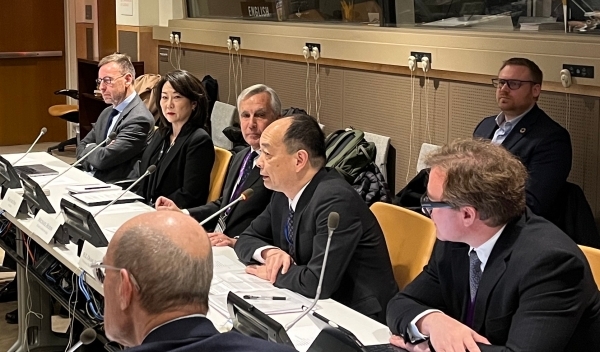日本政府・高齢化に関する世界連合(GCOA)共催 シルバーエコノミーフォーラムにおける山中大使ステートメント
令和5年12月7日

Ladies and Gentlemen, esteemed colleagues, and valued partners,
It is an honor to represent Japan at the Silver Economy Forum, co-hosted by the Permanent Mission of Japan to the United Nations and the Global Coalition on Aging. I extend my deepest gratitude to all co-hosts, speakers, and attendees for their contributions to this vital discussion.
As we stand at the cusp of a demographic transformation, with over 2 billion people expected to be over 60 by 2050, it is imperative that we collaboratively address the challenges and opportunities presented by an aging population. The Silver Economy is not merely an economic concept; it represents a fundamental shift in how we perceive aging and value the contributions of our elder citizens.
Japan, as a nation experiencing significant demographic shifts, recognizes the importance of innovative approaches in healthcare and social systems. Our journey began with the establishment of Universal Health Coverage in 1961, ensuring equitable access to healthcare for all citizens. The launch of our long-term care insurance system in 2000 was a pioneering step in supporting our aging population.
However, the journey does not end here. We are continuously adapting, focusing on preventive care and cost-effective healthcare interventions. For instance, the inclusion of the pneumococcal vaccine for the elderly in our national immunization program is a testament to our proactive approach towards healthcare.
Addressing the 'silent disease' of osteoporosis, we have implemented secondary fracture prevention strategies and leveraged technology, such as AI, to enhance early detection and treatment. These initiatives are not isolated endeavors but part of our commitment to contribute to the global knowledge pool on managing aging populations.
In line with the U.N. Decade of Healthy Ageing and the Sustainable Development Goals, Japan is dedicated to creating an inclusive society that values the contributions of all ages. We believe in a balanced approach that combines curative and preventive medicine, aiming for not just longevity but a state of complete physical and social well-being for our elderly.
As we share our experiences and strategies, we are reminded of the importance of collaborative efforts. The challenges we face are universal, transcending borders and cultures. It is through forums like this that we can forge partnerships and share insights, ensuring that we create a world where everyone can age with dignity and health.
In closing, I wish to express my appreciation once again to the Global Coalition on Aging, all co-hosts, and the distinguished participants for their commitment to this critical cause. Together, let us continue to innovate, collaborate, and drive forward the agenda for a sustainable and inclusive future for all ages.
Thank you.
